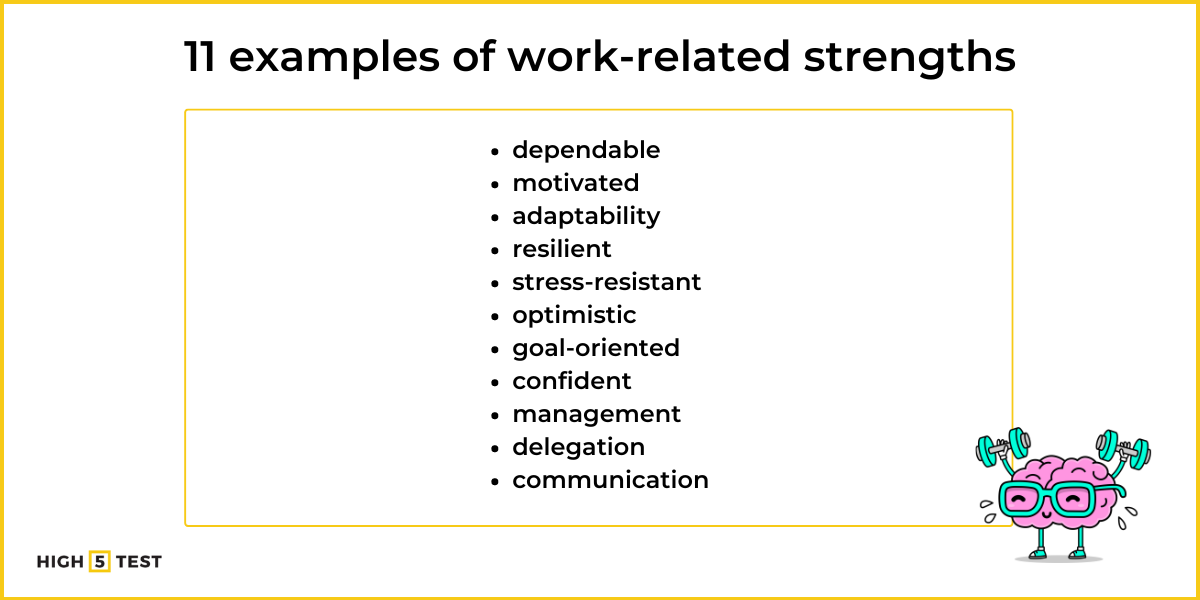It can be very difficult to find the right job that aligns with your personality type and allows you to thrive. When you don’t work in an environment that complements your unique strengths, it’s easy to feel like a square peg trying to fit into a round hole. However, understanding your innate strengths through a comprehensive assessment like the HIGH5 test can empower you to make more informed career choices and find roles that truly resonate with who you are.
By identifying and leveraging your natural talents, you can unlock your full potential and experience greater fulfillment and success in your professional endeavors. This post is designed to help you understand what types of jobs are likely to be good fits for your personality type and strengths so that you can start making better choices about where you want to work.
What are work-related strengths?
Work-related strengths can be defined as the skills, abilities, and personality traits that an individual naturally excels at and uses to achieve their goals in the workplace. While some may believe these strengths are innate, the reality is that they often develop and evolve over time through practice, experience, and self-awareness. This is where a tool like the HIGH5 strengths assessment can prove invaluable. By providing a comprehensive evaluation of your unique strengths, HIGH5 empowers you to gain a deeper understanding of your core competencies and how to leverage them effectively in your professional pursuits.
With this insight, you can make more informed decisions about the types of roles and environments that will allow you to thrive, ultimately leading to greater job satisfaction, productivity, and career growth. There are many reasons why it is important to have work-related strengths. As the world continues to change and develop, there will always be new challenges that need solutions or problems that must be addressed. Because of this, having different types of skills means you can offer something unique and valuable in a workplace situation. It will provide more growth opportunities as well because you might stagnate without any need for improvement or personal development. All these things lead to being able to make better choices about where we want to work going into our future careers and career growth opportunities.
In addition, having different skills will make it easier to change jobs if your current one is no longer enjoyable. It also means you can be confident and proud of what you bring to a workplace because it reflects on who you are as an individual. There is a misconception that people are somehow born with these specific strengths but the reality is that they actually develop over time with practice and experience.
Pro Tip From HIGH5
Utilize the HIGH5 strengths assessment to gain a comprehensive understanding of your unique strengths profile. Once you’ve identified your top strengths, reflect on how they manifest in your daily work and how you can capitalize on them even further. For instance, if one of your strengths is attention to detail, consider seeking out projects or roles that require meticulous planning and execution, such as project management or quality assurance.
11 examples of work-related strengths
The following is a list of what we believe are some of the most important strengths in the workplace:

- dependable
- motivation
- adaptability
- resilience
- stress-resistant
- optimistic
- goal-oriented
- confident
- management
- delegation
- communication
Communication
The skillset required for having great verbal and non-verbal communication traits. That means writing clearly and persuasively and speaking confidently and persuasively in speech, in a way that is easy for others to understand.
Dependable
Dependability is a crucial strength in any work environment as it signifies reliability and consistency in performance. A dependable individual consistently meets deadlines, fulfills promises, and maintains a steady work ethic, even under fluctuating circumstances.
This reliability builds trust with colleagues and supervisors and ensures that team projects run smoothly and efficiently, as others can count on a dependable person to deliver as expected without needing frequent oversight.
Motivation
Motivation is the internal drive that propels individuals to initiate and complete tasks. It is a critical strength as it fuels persistence and pursuing goals despite obstacles. Highly motivated individuals are often self-starters eager to tackle new challenges and contribute positively to their work environment. Their enthusiasm can be contagious, potentially inspiring and elevating the entire team’s morale.
Adaptability
Adaptability refers to the ability to adjust to new conditions quickly and effectively. In the fast-paced, ever-changing business world, adaptable employees can pivot strategies, change project directions immediately, and handle unexpected situations with composure. This flexibility makes them invaluable as they help organizations navigate changes without losing momentum.
Resilience
Resilience is the capacity to recover quickly from difficulties; it’s about returning from setbacks with a positive attitude. Resilient workers can cope with job stress, failures, or criticism, and return to their previous level of emotional well-being without losing their productivity. This strength is vital for maintaining long-term career success and personal well-being, as it prevents burnout and encourages a balanced approach to work challenges.
Stress-resistant
Being stress-resistant means managing high-pressure situations calmly and efficiently without becoming overwhelmed. Stress-resistant individuals maintain their productivity under stress by employing coping strategies that mitigate the adverse effects of stress. This ability helps maintain clear, strategic thinking when it matters most and protects one’s health from the negative impacts of chronic stress.
Optimistic
Optimism is a strength characterized by a general expectation that good things will happen or that challenges can be overcome. Optimistic individuals contribute a positive outlook to their teams, often seeing opportunities where others might see barriers.
This attitude helps in fostering a collaborative and innovative work environment, as optimists are likely to push forward with initiatives and motivate others even during difficult times.
Goal-oriented
Goal-oriented individuals are focused on setting and achieving objectives. They break down larger tasks into manageable pieces and are often excellent at prioritizing activities that move them closer to their goals. This strategic approach ensures efficiency and productivity, keeping projects on track and aligning team efforts with organizational objectives.
Confident
Confidence in the workplace means trusting one’s abilities and judgment. Confident individuals are more likely to take on challenging projects, share valuable ideas, and assume leadership roles. Their self-assuredness often inspires trust and respect from colleagues, leading to greater organizational influence and responsibility.
Management
Management skills involve overseeing projects, resources, and personnel to achieve specific objectives. Effective managers are adept at planning, organizing, leading, and controlling. They are key in making strategic decisions that guide their departments or organizations toward success.
Moreover, good managers are skilled in motivating their teams, resolving conflicts, and ensuring that goals are met efficiently and ethically.
Delegation
Delegation is assigning responsibility to others appropriately and empowering them to complete the tasks effectively. It is a crucial management skill that enhances team capacity and fosters trust between supervisors and their teams.
Effective delegation involves not just parceling out tasks but also providing the necessary resources and guidance to ensure success while also holding individuals accountable for their roles. This approach helps build a resilient team that can handle diverse challenges independently.
Emotional intelligence
Having the ability to understand and regulate your own emotions, as well as the ability to empathize with others. It is always a great thing to be a positive guy in a group.
Leadership skills
The set of abilities that allow you to influence other people or groups; to get them involved in a task by providing direction while having clear goals set.
Strong work ethic
Having the desire to work hard and the willingness to go beyond what is required. Co-workers admire these qualities because it means they can depend on you when the need arises.
How do you identify your workplace strengths?
The first step is to think about what you are good at, and what are your strengths. What do people compliment you on or ask for help with most often? What are the things that energize and inspire you, keeping you coming back for more? Is there a type of work or project that has always drawn your attention and seems right up your alley? Once you have identified some possibilities, take a closer look at them. Do any of these areas relate to an area where the company needs help or growth potential (e.g., marketing)? Have these skills been recognized by others around the company or in the community?
Or take the strengths test with HIGH5
There are a few strengths tests out there, but only one stands out and that is the strengths test from HIGH5 and it is completely free. Feel free to take it here. The second step is to determine what these strengths look like on paper.
Ask yourself these questions:
- What do you most enjoy doing?
- What are your favorite tasks, projects, assignments, and responsibilities at work?
- How would you describe yourself in terms of how others perceive you professionally (e.g., self-motivated with an eye for detail)?
Once you know how they appear on paper, identify career paths with their specific hard skill that match them as closely as possible so that your day-to-day work will be productive and fulfilling for both you and the company. Ideas for some common career paths to consider:
- Business development: If one of your top skills is salesmanship, business development may be a good fit because it requires creativity and strategic thinking.
- Design: If you’re creative and enjoy solving problems, this may be a good fit for you as the design field is an ever-changing landscape with new challenges.
- Public relations (PR): This job requires strong communication skills to deal with clients, reporters, or other media outlets on behalf of your company. PR professionals are often required to speak at conferences and events which can open doors in terms of networking opportunities outside of work hours
- Finance analysis: Strong analytical abilities coupled with detail-oriented tendencies make this a potential career path worth exploring if it lines up closely enough with some of your strengths
- Editorial assistant: For many people who enjoy being behind the scenes, editorial assistant positions offer plenty of opportunities
- Marketing: Marketing professionals need to be strong with research skills, creative thinking, and the ability to write
- Human resources: A degree or background in HR can make a human resources professional uniquely qualified for positions that require sound judgment
- Information technology (IT): IT jobs are plentiful these days. Everything from software developers, computer network architects, database administrators, and web designers all fall under this umbrella category
Pro Tip From HIGH5
After taking the HIGH5 strengths assessment, take the time to reflect on how your top strengths have contributed to your past successes and fulfillment in the workplace. Consider seeking out roles or projects that align with and allow you to leverage these strengths regularly. Additionally, explore opportunities for professional development or cross-training that can help you further enhance and refine your strengths.
How to use strengths in the workplace?
Using strengths in the workplace involves recognizing and applying your natural talents to contribute effectively to organizational goals. For instance, if adaptability is a key strength, you might volunteer to lead projects that require quick shifts in strategy or approach, showing readiness to tackle challenges in dynamic conditions.
Similarly, a person with strong delegation skills can enhance team productivity by assigning tasks that align with each member’s skills, thus ensuring that projects are completed efficiently. This strategic application boosts individual performance and enhances team collaboration and overall business outcomes.
Strengths-based workplace culture in the workspace
A strengths-based workplace culture focuses on identifying and maximizing each employee’s unique strengths, rather than solely improving their weaknesses. For example, a company may use regular strengths assessments to place employees in roles that naturally align with their abilities, such as a highly empathetic person in client relations, where they can excel at understanding and meeting client needs.
This approach not only boosts employee engagement and satisfaction but also drives innovation and efficiency by ensuring that everyone is in a position to do their best work. Such a culture fosters a positive work environment where contributions are valued, and personal growth is encouraged.
How do you highlight work-related strengths in a resume/CV?
Highlighting work-related strengths in a resume or CV involves clearly articulating how your specific abilities have contributed to your past job roles. For instance, if “leadership” is a strength, you could mention a scenario where you led a team to complete a project under budget and ahead of schedule.
Using quantifiable achievements that directly reflect your strengths is effective, such as “increased team productivity by 20% through effective delegation and motivational techniques.” This method showcases your skills and provides concrete evidence of your capabilities to potential employers.
How do you highlight work-related strengths in a job interview?
To effectively highlight work-related strengths in a job interview, prepare to share specific examples that demonstrate how you’ve successfully applied these strengths in your previous roles. For instance, if your strength is adaptability, describe a situation where you had to quickly adjust to a major change in a project or overcome an unexpected challenge.
Using the STAR method (Situation, Task, Action, Result) is beneficial to structure your responses, which helps clearly convey the impact of your strengths. This approach proves your capabilities and shows your self-awareness and ability to leverage your strengths in practical scenarios.
How do you turn your work-related weaknesses into strengths?
Turning work-related weaknesses into strengths involves self-awareness, targeted improvement, and strategic application. For example, if you struggle with public speaking, you could start by engaging more in smaller group discussions to build confidence, then gradually participate in larger presentations with prepared topics.
Setting specific, achievable goals for gradual improvement and seeking feedback to monitor progress is important. This process mitigates the weakness and can transform it into a valuable asset over time, enhancing your overall professional capability.
What are work-related weaknesses?
There can be many weaknesses that come with the territory of being at work. However, it is important to know what they are to make sure you don’t get blindsided by them and find yourself feeling like all hope is lost. What are these workplace weaknesses? If you’re an employer, do you want to hire someone who is strong in every area or would you rather hire someone who might struggle but excels at one thing?
It’s difficult to know what to expect from individuals and it can be hard for employers to make sure they have enough employees with strengths in each area. For any company to succeed, it needs employees with different skill sets. While it’s important to be aware of your workplace weaknesses, don’t let them get you down.
There are many ways to turn these negatives into positives and find a way to make the work environment more enjoyable for everyone involved. As a side note, if you’re an employer, it’s good to know about two types of punishment that exist. These punishments can be used if you’re finding it difficult to get employees in line.
The first is positive punishment. This happens when you add a negative consequence to something in order to prevent the same thing from happening again. On the other hand, negative punishment includes removing an item that one may enjoy following said undesired behavior, so as not to be rewarded for doing what was seen as wrong and deterring future responses.
With that said, it’s always important to understand strengths and weaknesses in the workplace. Take some time to reflect on what you’re good at, and then think about areas where you could improve.
Pro Tip From HIGH5
Approach your work-related weaknesses from a strengths-based perspective. Reflect on how your top strengths, as identified by the HIGH5 assessment, can be leveraged to address or compensate for areas of weakness. For example, if you struggle with impatience, but one of your strengths is problem-solving, you can develop techniques that allow you to channel your problem-solving skills to work through challenges methodically, rather than succumbing to impatience.
10 examples of work-related weaknesses
The following is a list of workplace weaknesses that people often struggle with:
- Disorganized
- Poor communication skills
- Unconfident
- Apathy
- Inflexibility
- Indecisiveness
- Impatience
- Focusing too much on the details
- Having trouble saying no to others when it’s required
- Taking too many risks
Lack of organizational skills
Missing some basic organizational skills or being disorganized makes it difficult to succeed in anything that you do.
Poor communication skills
Not being able to listen or articulate well with others will definitely hurt your team’s success.
Lack of confidence
This is often the result of low self-esteem and poor social connections. Those who lack confidence may be less likely to volunteer their opinion during meetings, which can lead them to feel left out when decisions are made without input from everyone involved.
Apathy
It’s hard to have a good understanding of how other people feel if you’re unable to put yourself in their shoes and see things from their perspective. This can make conflict resolution difficult as it prevents those who lack empathy from seeing what might help someone else more than themselves.
Inflexibility
If you’re inflexible in how you do things, it can lead to frustration and resentment when someone doesn’t follow the “right” way. This can definitely cause some tension in the workplace.
Indecisiveness
Indecisive people may find themselves constantly on edge about what they should be doing next or whether a choice is right for them. This type of stress often leads to procrastination.
Impatience
Patience is key but it’s not always easy. Impatient people will want everything done immediately and have little tolerance for any delays that arise along the way.
Focusing too much on the details
Too often people get stuck on the small details that they forget to see the big picture; it’s good to have high standards, but perfectionists may be so focused on doing things “right” that they don’t take risks or experiment with different ways of solving problems.
Having trouble saying no to others when it’s required
Dependents tend to have difficulty saying no, and this can lead them to feel taken advantage of or overwhelmed.
Taking too many risks
Too many risks can lead a person to be reckless, failing to think through and plan their actions. This can cause people to make rash decisions based on the moment rather than thinking about how it will affect their future.
Work-related strengths FAQ
What are the top 3 work strengths?
The top three work strengths often valued in most fields are communication skills, problem-solving abilities, and adaptability.
What is your 3 strength best answer?
My three strongest attributes are my ability to communicate effectively in writing and verbally, my critical thinking skills, which enhance my problem-solving capabilities, and my resilience, which allows me to handle pressure and setbacks efficiently.








